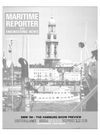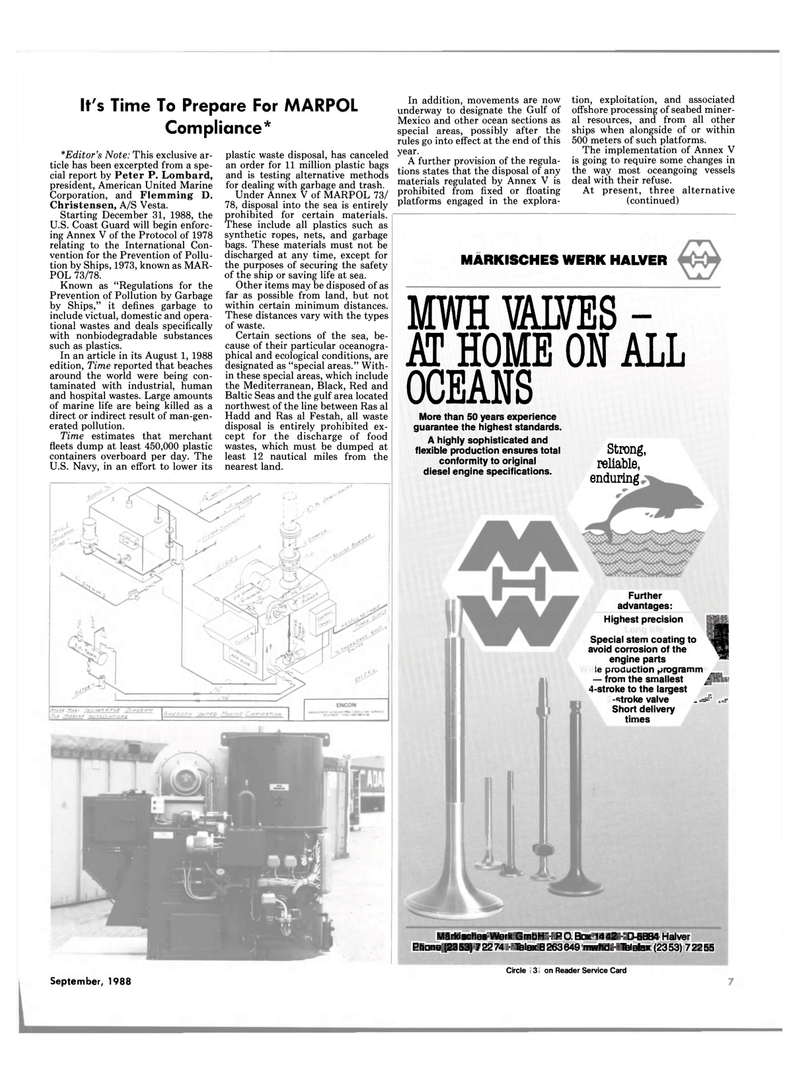
Page 5: of Maritime Reporter Magazine (September 1988)
Read this page in Pdf, Flash or Html5 edition of September 1988 Maritime Reporter Magazine
It's Time To Prepare For MARPOL
Compliance* *Editor's Note: This exclusive ar- ticle has been excerpted from a spe- cial report by Peter P. Lombard, president, American United Marine
Corporation, and Flemming D.
Christensen, A/S Vesta.
Starting December 31, 1988, the
U.S. Coast Guard will begin enforc- ing Annex V of the Protocol of 1978 relating to the International Con- vention for the Prevention of Pollu- tion by Ships, 1973, known as MAR-
POL 73/78.
Known as "Regulations for the
Prevention of Pollution by Garbage by Ships," it defines garbage to include victual, domestic and opera- tional wastes and deals specifically with nonbiodegradable substances such as plastics.
In an article in its August 1, 1988 edition, Time reported that beaches around the world were being con- taminated with industrial, human and hospital wastes. Large amounts of marine life are being killed as a direct or indirect result of man-gen- erated pollution.
Time estimates that merchant fleets dump at least 450,000 plastic containers overboard per day. The
U.S. Navy, in an effort to lower its plastic waste disposal, has canceled an order for 11 million plastic bags and is testing alternative methods for dealing with garbage and trash.
Under Annex V of MARPOL 73/ 78, disposal into the sea is entirely prohibited for certain materials.
These include all plastics such as synthetic ropes, nets, and garbage bags. These materials must not be discharged at any time, except for the purposes of securing the safety of the ship or saving life at sea.
Other items may be disposed of as far as possible from land, but not within certain minimum distances.
These distances vary with the types of waste.
Certain sections of the sea, be- cause of their particular oceanogra- phical and ecological conditions, are designated as "special areas." With- in these special areas, which include the Mediterranean, Black, Red and
Baltic Seas and the gulf area located northwest of the line between Ras al
Hadd and Ras al Festah, all waste disposal is entirely prohibited ex- cept for the discharge of food wastes, which must be dumped at least 12 nautical miles from the nearest land.
In addition, movements are now underway to designate the Gulf of
Mexico and other ocean sections as special areas, possibly after the rules go into effect at the end of this year.
A further provision of the regula- tions states that the disposal of any materials regulated by Annex V is prohibited from fixed or floating platforms engaged in the explora- tion, exploitation, and associated offshore processing of seabed miner- al resources, and from all other ships when alongside of or within 500 meters of such platforms.
The implementation of Annex V is going to require some changes in the way most oceangoing vessels deal with their refuse.
At present, three alternative (continued)
MARKISCHES WERK HALVER
MWHVMJ/ES-AI HOME ON ALL
OCEANS
More than 50 years experience guarantee the highest standards.
A highly sophisticated and flexible production ensures total conformity to original diesel engine specifications.
Strong, reliable, enduring
Further advantages:
Highest precision
Special stem coating to avoid corrosion of the engine parts le production programm — from the smallest JBBm 4-stroke to the largest -stroke valve .. s •• '*.. •
Short delivery times i
Markisches Werk GmbH • RO.Box 1442 • D-5884 Halver
Phone (2353) 72274 • Telex 8263649 mwhd - Telefax (2353) 72255
Circle 345 on Reader Service Card
September, 1988 7

 4
4

 6
6
